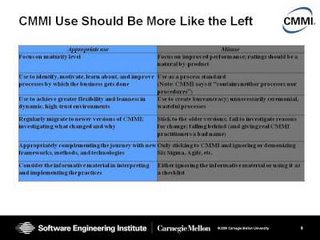Field notes from SEPG-NA 2009 - Tuesday
San Jose, CA. Day started (for me) @ 4:45am PDT (which my body believed to be 7:45am) with a work out, some email and chat, quick breakfast, and a teleconference with a prospective client. I arrived to the conference hall just as Dr. Paul Nielsen, CEO of SEI was introducing the first keynote, Scott Cook co-founder of Intuit Inc. (now chairman of the company's Executive Committee of the Board).

He also told the old story about Chevrolet and Toyota in which Toyota ran a Chevrolet factory in this area using their production system keeping Chevrolet's UAW employees. Resulting in turning the worst plant in the company into the best Chevy plant in the entire company. Anyway, he probably spent too much time on that story. Unfortunately, too many people in these circles aren't professionals in process improvement to know that story -- which is now part of the process improvement lore.
Though he summarized TPS in an interesting way, saying that it's a process for rapid experimentation. I can see how he'd come to that conclusion considering the emphasis with TPS on Kaizen. He also spoke about the lack of process improvement in businesses who would desperately need it, like hospitals today in the USA. (I should note that UPMC is an exception in leading the way. Get with it everyone else!)

Very refreshing keynote in that he was brutally honest about quality and findings of their investigation into what drives customer experience and loyalty. They take process so seriously that they tie improvement to metrics, goals and bonuses.... FROM THE CEO on down! NOT process compliance or some crap like that, but their actual demonstrable process performance measures tied to money as a function of whether it supports their corporate goals — which are laser-focused on customer experience. EMC is looking to implement all three CMMI constellations. For good measure, he spoke about the fact that they're using agile practices all over the place.
Who's "pushing" them to do all this? NO ONE OTHER than themselves. Almost makes me want to work there. Almost.
In all, really great keynotes. Each SEPG conference should be so lucky.
Next up: CMMI or Agile: Why Not Embrace Both! Being led by Mike Konrad. Jeff Dalton, David and I joined Mike on stage. We stood because there weren't enough seats for the audience and the union wouldn't allow us to bring any more seats into the room due to capacity concerns.  (In fact, a guy stood outside the room to prevent people from coming in. One such person blocked out was Alistair Cockburn, whom I went out to drag in despite the protests of the bouncer dude.) Mike reprised a presentation he'd done elsewhere summarizing the main points of our paper and adding some new material making a case for process discipline in a couple of engineering-related process areas of interest. The slide, here, is an idea David and I intend to "borrow" from, depicting, manifesto style, concepts we value from CMMI compared to other concepts possible from CMMI we value less.
(In fact, a guy stood outside the room to prevent people from coming in. One such person blocked out was Alistair Cockburn, whom I went out to drag in despite the protests of the bouncer dude.) Mike reprised a presentation he'd done elsewhere summarizing the main points of our paper and adding some new material making a case for process discipline in a couple of engineering-related process areas of interest. The slide, here, is an idea David and I intend to "borrow" from, depicting, manifesto style, concepts we value from CMMI compared to other concepts possible from CMMI we value less.
Last for me for the day was an interesting perspective on CMMI and Innovation. Presenters' positions are that CMM started as something that would help organizations take revolutionary steps in innovative improvements as well as evolutionary steps and that while the model 
Labels: David Anderson, Innovation, Jeff Dalton, Mike Konrad, SEPG, TPS

0 Comments:
Post a Comment
Subscribe to Post Comments [Atom]
<< Home